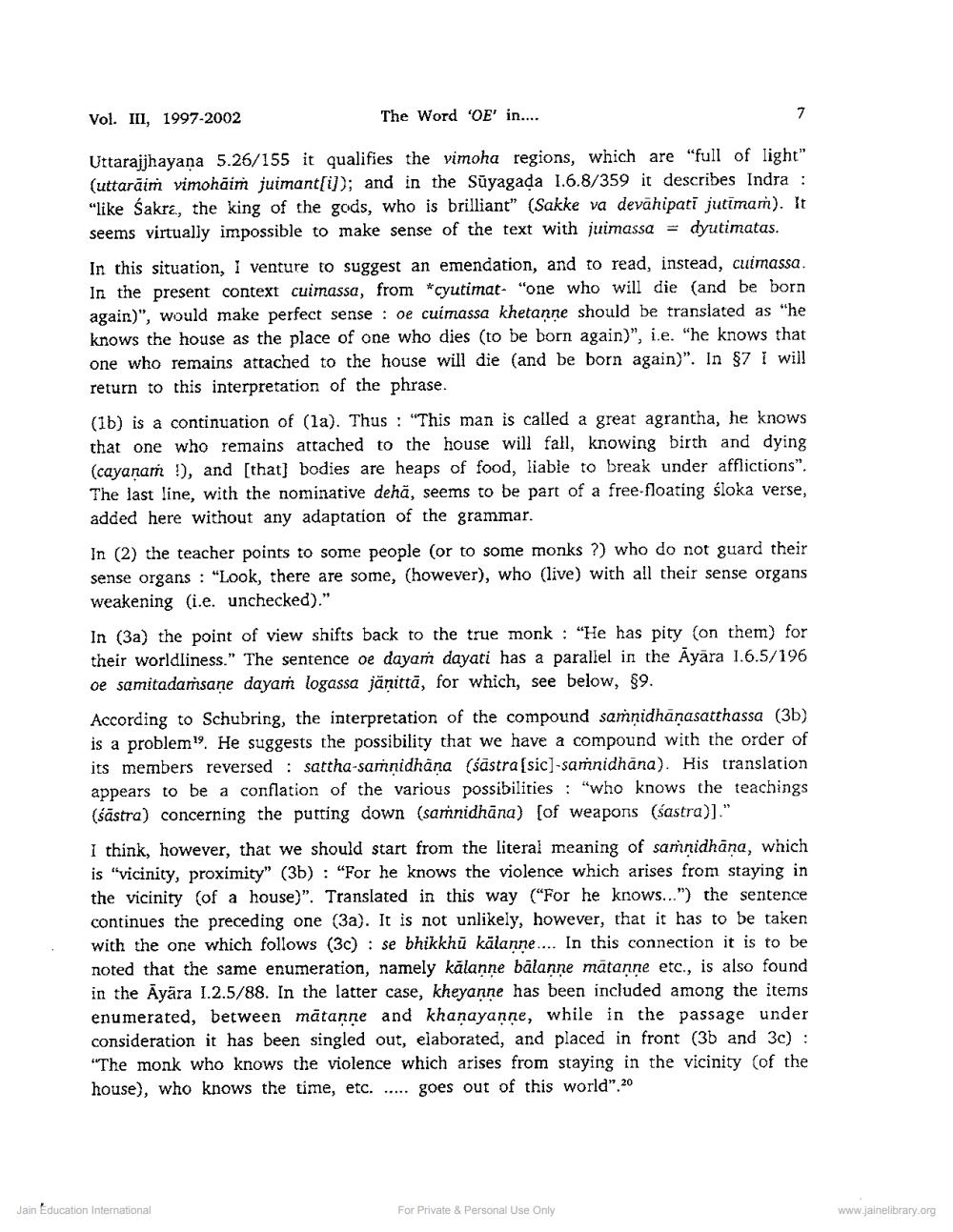Book Title: Word OE in Some Canonical Jaina Texts Author(s): Hermen Tieken Publisher: Z_Nirgrantha_1_022701.pdf and Nirgrantha_2_022702.pdf and Nirgrantha_3_022703.pdf View full book textPage 5
________________ Vol. III, 1997-2002 The Word 'OE' in.... Uttarajjhayana 5.26/155 it qualifies the vimoha regions, which are "full of light" (uttaraim vimohāim juimant[i]); and in the Suyagada 1.6.8/359 it describes Indra : "like sakra, the king of the gods, who is brilliant” (Sakke va devāhipati jutīmam). It seems virtually impossible to make sense of the text with juimassa = dyutimatas. In this situation, I venture to suggest an emendation, and to read, instead, cuimassa. In the present context cuimassa, from *cyutimat-"one who will die (and be born again)", would make perfect sense : oe cuimassa khetanne should be translated as "he knows the house as the place of one who dies (to be born again)", i.e. "he knows that one who remains attached to the house will die (and be born again)". In $7 I will return to this interpretation of the phrase. (1b) is a continuation of (la). Thus : "This man is called a great agrantha, he knows that one who remains attached to the house will fall, knowing birth and dying (cayanam !), and [that] bodies are heaps of food, liable to break under afflictions”. The last line, with the nominative dehä, seems to be part of a free-floating sloka verse, added here without any adaptation of the grammar. In (2) the teacher points to some people (or to some monks ?) who do not guard their sense organs : "Look, there are some, (however), who (live) with all their sense organs weakening (i.e. unchecked)." In (3a) the point of view shifts back to the true monk : "He has pity (on them) for their worldliness." The sentence oe dayam dayati has a parallel in the Ayāra 1.6.5/196 oe samitadamsane dayam logassa jänitta, for which, see below, $9. According to Schubring, the interpretation of the compound samnidhanasatthassa (3) is a problem". He suggests the possibility that we have a compound with the order of its members reversed : sattha-samnidhana (sastra [sic]-samnidhāna). His translation appears to be a conflation of the various possibilities: "who knows the teachings (śāstra) concerning the putting down (samnidhāna) (of weapons (sastra)]," I think, however, that we should start from the literal meaning of samnidhana, which is "vicinity, proximity" (3b) : "For he knows the violence which arises from staying in the vicinity of a house)". Translated in this way (“For he knows...") the sentence continues the preceding one (3a). It is not unlikely, however, that it has to be taken with the one which follows (30) : se bhikkhu kälanne.... In this connection it is to be noted that the same enumeration, namely kälanne bälanne mätanne etc., is also found in the Āyära 1.2.5/88. In the latter case, kheyanne has been included among the items enumerated, between mätanne and khanayanne, while in the passage under consideration it has been singled out, elaborated, and placed in front (36 and 3c) : "The monk who knows the violence which arises from staying in the vicinity of the house), who knows the time, etc. ..... goes out of this world".20 Jain Education International For Private & Personal Use Only www.jainelibrary.orgPage Navigation
1 ... 3 4 5 6 7 8 9 10 11 12 13 14 15 16
